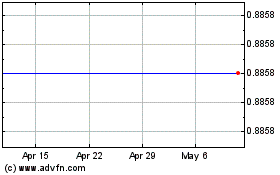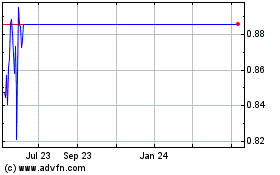Boeing Co. is ramping up its push into the parts business, as
part of a broad effort to cut costs and secure a new source of
revenue even more lucrative than making aircraft.
In the past, airlines could purchase parts directly from one of
Boeing's largest suppliers, Spirit AeroSystems Holdings Inc.,
allowing it to diversify its business beyond the 80% of its sales
linked to jet production at the Chicago-based plane maker.
But in late February, Boeing quietly stopped Spirit from selling
parts such as engine thrust reversers and other large parts
directly to airlines, according to both companies. Boeing said it
also stopped granting new licenses to suppliers to sell proprietary
parts to its airline customers.
It is the most aggressive move to date in Boeing's yearslong
effort to assert control over distribution—and the resulting
revenue—of spare parts.
The initial sale of a jetliner is a comparatively smaller
portion of the revenue that aircraft will generate during their
multidecade life. The greater proportion of revenue on any single
plane comes from the lifetime maintenance and parts that range from
fire extinguishers and seat belts to on-board computers and landing
gear shared across hundreds of companies.
These parts at airlines and maintenance facilities can fetch up
to 4.5 times more than what Boeing pays for the parts during
initial production, according to one supply-chain official.
Spirit will continue to manufacture the spares but will have to
sell them through Boeing, with the plane maker taking a cut. A
Spirit spokesman said the license was a "small component" of its
overall business and airlines would still need parts it
manufactures.
Boeing executives say the shift is in response to customers who
increasingly scrutinize deals—not only on the performance of its
jets, but on the total costs of lifetime ownership. Many analysts
also have long questioned why some of Boeing's suppliers earn
fatter profit margins than the world's largest aerospace
company.
And nothing prohibits Boeing from expanding its business model
to emulate engine-makers and business-jet manufacturers, which have
tightly controlled that lucrative pipeline with its customers.
Now the company wants to more than triple sales of its
commercial and defense aviation parts and services business to
about $50 billion by 2025 from an estimated $15 billion last year,
according to an industry strategist.
As cost-conscious airlines drive down prices for jetliners,
Boeing is searching for new revenue, said Kevin Michaels, vice
president with ICF International's aerospace-consulting
practice.
It isn't just parts. Boeing in April said it would promote
economy-class seats made by new entrant Lift, giving the unit of
Encore Corporate Inc. preferred access to its single-aisle jets. In
return, Boeing will be able to sell the seats to airlines when
carriers refresh older planes with plusher interiors.
A spokesman for Lift said Boeing approached it to collaborate on
the new seat's design, which will be ready in 2017.
"The things that we're doing to change our business
relationships in the supply base are directly related to how we
feel we need to change to compete," said Kent Fisher, vice
president of supplier management for Boeing's commercial unit. "I
know it can be painful for some of the players, but that's why
we're doing it."
The quest for extra revenue comes as Boeing continues a broader
cost-cutting effort with suppliers, known in the industry as
Partnering for Success. It sought about 15% reductions in unit
costs for the parts suppliers provide for the company's jets.
Boeing's cost-cutting isn't limited to suppliers. Boeing said it
would cut about 4,500 positions, in part to offer a more
competitive price to airlines for its jets and deliver a promised
cash windfall to investors.
But with 65% of its costs outside of its factories, the
company's focus on the supply chain is getting a renewed
emphasis.
In many cases, Boeing provided additional work to suppliers who
quickly locked in new contracts and took work away from those that
didn't secure a deal, according to suppliers. Boeing also
prohibited some suppliers from being given new work or withheld
regulatory approvals for parts until revised contracts were
complete, they said.
Boeing executives in February said it was restarting the
cost-cutting process with suppliers, emphasizing its need for lower
costs would be a continuous effort.
The shift to directly claiming revenues that normally go to its
suppliers is causing significant concern in the suppliers'
sector.
"They're trying to cancel everybody's business model," said a
business-development official at one major Boeing supplier.
Not all suppliers are upset about Boeing's moves. Rockwell
Collins Inc. chief executive Kelly Ortberg said its contract
negotiations with Boeing included changes to its aftermarket sales
and considered it a positive for both companies.
New airplanes like the Dreamliner are so infrequently developed
that suppliers sign ultra-competitive contracts that gives the
lowest possible costs for systems or components to manufacturers
for factory installation—with the expectation that airlines and
maintenance facilities will pay premium prices for spares for
decades.
"The economics of being a Boeing supplier could be facing their
greatest challenge yet," wrote Robert Spingarn, aerospace analyst
for Credit Suisse.
Suppliers most at risk for Boeing reclaiming aftermarket control
are those that build parts originally designed by Boeing, like many
of those made by Spirit, analysts say.
For those parts designed by its suppliers, Boeing in 2012 began
charging suppliers a royalty for selling replacement parts to
airlines or upgrades such as new in-flight entertainment systems,
saying they were created using the plane-maker's intellectual
property.
To be sure, suppliers have enjoyed their lucrative position
selling parts direct to airlines, which have grown frustrated with
increasing prices. The International Air Transportation Association
on behalf of its member airlines in March filed a complaint with
the European Commission alleging abuses by suppliers into pricing
for spare parts.
"This is an area of deep concern for our members. There are
relatively few equipment vendors and our members are frustrated
that there is little flexibility in negotiations for aftermarket
services," Tony Tyler, IATA's director general said last month.
Write to Jon Ostrower at jon.ostrower@wsj.com
(END) Dow Jones Newswires
April 22, 2016 08:25 ET (12:25 GMT)
Copyright (c) 2016 Dow Jones & Company, Inc.
Credit Suisse (NYSE:CS)
Historical Stock Chart
From Mar 2024 to Apr 2024

Credit Suisse (NYSE:CS)
Historical Stock Chart
From Apr 2023 to Apr 2024
